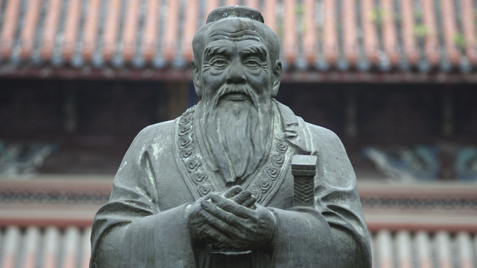

/ Originally published in the Los Angeles Times, October 1, 2010
Confucius, the venerable Sage who lived in the 6th century BC, is enjoying a 21st century revival. His rehabilitators? The Chinese Communist Party. Yes, that party, the one celebrating the 61st anniversary of the founding of the People's Republic of China on Oct. 1. The same party whose chairman, Mao Zedong, vilified Confucius' “stinking corpse” during the Cultural Revolution and ordered the Red Guards to destroy all temples, statues, historical landmarks and texts associated with the Sage. But, as China turns 61, the Great Helmsman is out and Confucius, who would have turned 2,561 on Sept. 28, is in.
As early as February 2005, the Beijing leadership began endorsing the Sage's teachings again, citing him approvingly in a speech delivered to the National Congress by President Hu Jintao: “Confucius said, ‘Harmony is something to be cherished.’ ” Since then the terms “harmonious society” and “harmonious world” have become mantras of the party leaders and the basis of their domestic and foreign policies. During the opening ceremonies of the 2008 Olympics, the world was greeted not by quotations from Mao's Little Red Book but by warm homilies from the teachings of Confucius.
What explains this redemption? Confucius gave attention to two overarching matters: what makes for good government, and what makes for a morally good individual. His answers were elegant — and compelling — in their simplicity. Good government rules not by physical force but through moral force. The ideal ruler embodies virtue, which is expressed in his unfailingly benevolent treatment of the people. In turn, the people voluntarily, even eagerly, choose to follow him.
Because government, to be good, requires a good ruler — and good officials — Confucius also characterizes what makes for a good person: someone who possesses a love of learning; strives to achieve benevolence, righteousness, propriety and wisdom; treats others as he would wish to be treated; is trustworthy and loyal as a friend, filial as a son and obedient as a subject; and, reciprocally, is affectionate and caring as a parent or an official.
What in this millenniums-old vision resonates with Beijing today?
With the proclamation “to get rich is glorious,” Deng Xiaoping, China's paramount leader for two decades beginning in the late 1970s, ushered in the post-Mao era. An ideology of socialist revolution through class warfare gave way to an ideology of getting rich. And, of course, the Chinese — or at least some — have since become very wealthy indeed. But unbridled economic growth has spawned a host of problems: a widening gulf between rich and poor, urban and rural; heightened social tensions; increasing unemployment; rising crime; rampant corruption, especially among government officials and local business leaders; environmental degradation; healthcare and elderly care that is out of the reach of vast numbers of people; and a skyrocketing incidence of public protests (tens of thousands annually).
The Communist Party is neither unaware of nor insensitive to these problems. But it is determined to confront them without surrendering any of its political control or authority; it has shown little inclination to make substantive changes to the prevailing political system or institutions of government.
In the ideology of Confucianism, party leadership has rediscovered a potent language for addressing the challenges China now faces. The teachings of the Sage, after all, offer the promise of social harmony. The crux of the Confucian agenda is that individuals, whatever their social or economic status, are to treat their fellow human beings empathetically and with proper respect. A philanthropic, communal spirit imbues humanity, creating a society in which “all within the four seas are brothers.” Here the Beijing leadership sees an opportunity to lessen the wealth gap and ease social tensions — and at little financial cost to the government.
And if official corruption is one of the most serious grievances among the people — frequently capable of sparking social unrest — traditional Confucian teachings again provide authorities with the language to show the people that they are attacking it head-on. The official China Daily observed in 2007: “In traditional Confucianism, the cultivation of personal moral integrity is considered the most basic quality for an honest official. The qualities of uprightness, modesty, hard work, frugality and honesty that President Hu encourages officials to incorporate into their work and lifestyle are exactly the same as the moral integrity of a decent person in traditional culture.”
Confucius promises a government that cares for the people, that makes their well-being its primary concern. This is to govern by virtue. And virtue creates its own legitimacy: paternalistic, affectionate care of the people by the rulers is sure to be reciprocated by the people's trust and obedience. Hu Jintao's appropriation of the language of Confucianism not only fills the ideological void left by Marxist-Leninism's demise but also suggests to the governed that, in seeking to create a harmonious society and a harmonious world, he and other officials take their “Confucian” responsibility of moral leadership to heart. Their expectation is that the people, in turn, will place trust in the government and be obedient to it, with minimal dissent.
China's government appears determined to address the fissures and tensions born of almost three decades of unrestrained economic development. But it seems equally determined to bring about such change without reforming the prevailing one-party system of governance. The regime in Beijing, eager to keep its power intact, to maintain the political status quo, has chosen, for the time being, to goad the Chinese toward social harmony through traditional ideological and moral exhortations.
Resuscitating the Sage today thus serves the party’s political aims. But to conclude that cherry-picking soothing phrases from Confucian writings is the same as a genuine and enduring commitment to the vision of Confucius would be a mistake.
Daniel K. Gardner is Dwight W. Morrow Professor of History and Director of the Program in East Asian Studies at Smith College.
















